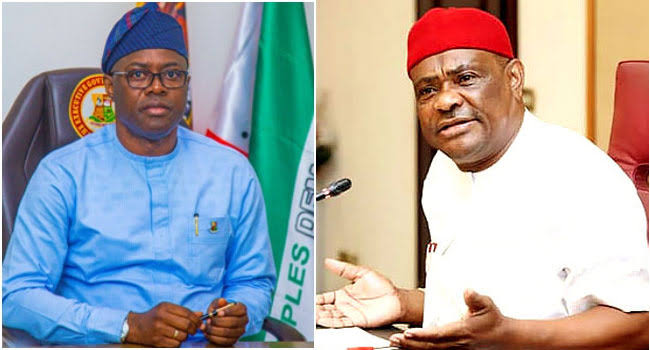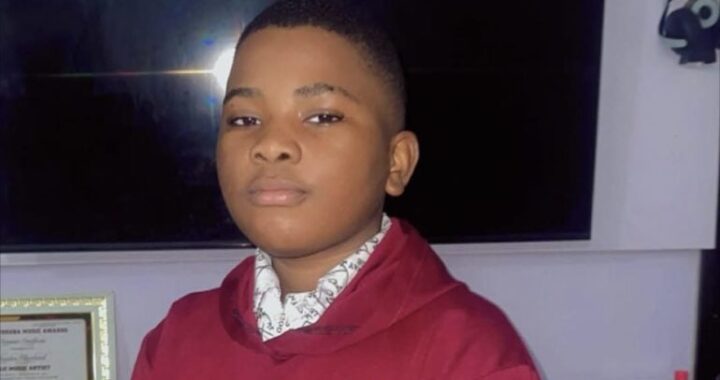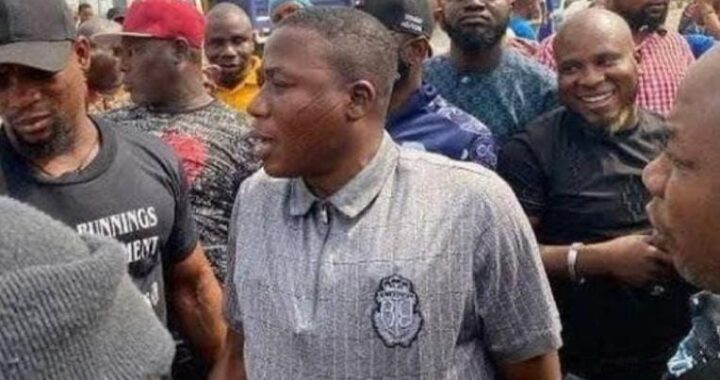The Peoples Democratic Party (PDP), once the dominant force in Nigerian politics, is now fighting for its very survival.
Since its crushing defeat in the 2023 general elections, the party has been plagued by internal divisions, leadership disputes, and a desperate attempt to maintain its position as Nigeria’s main opposition party.
At the heart of this turmoil are influential figures whose personal ambitions and grievances threaten to unravel the PDP’s legacy.
One of them is Nyesom Wike, the outspoken former Governor of Rivers State.
Now serving as Minister of the Federal Capital Territory (FCT) under the rival All Progressives Congress (APC), Wike’s ties to another party have sparked controversy and deepened mistrust within the PDP.
Then there’s Seyi Makinde, the Governor of Oyo State.
He has become a rising powerbroker within the party, funding the national secretariat and asserting increasing control over party decisions.
Alongside him, former Senate President Bukola Saraki faces the uphill task of reuniting a party riddled with factions and competing interests.
His job is clear, but the road ahead is anything but.
The G5 Factor
A critical part of the story is the G5; a bloc once seen as a formidable force within the PDP.
It paraded Wike, Makinde, and former Governors Samuel Ortom (Benue), Okezie Ikpeazu (Abia), and Ifeanyi Ugwuanyi (Enugu).
Before the 2023 elections, they stood together, demanding the resignation of the party’s National Chairman, Iyorchia Ayu. Their aim?
To ensure regional balance after Atiku Abubakar, a northerner, clinched the presidential ticket.
Their unity gave them strength, and that strength gave the PDP conditional hope.
But that unity did not last.
Wike’s decision to back APC candidate Bola Tinubu, a move that secured him a ministerial post, shattered the G5 alliance. What was once a united front collapsed into mutual suspicion.
Many within the PDP saw Wike’s actions as a betrayal, a move that fractured the party further and deepened its leadership crisis.
A Fragmented Opposition: The problems don’t stop there.
Outside the PDP, efforts to form a broader opposition coalition in time for the 2027 elections are also faltering.
The vision was clear: unite against the APC. But the PDP’s internal instability has delayed strategy meetings and disrupted plans.
Instead of a united opposition, what Nigerians see is confusion, competition, and missed opportunities.
And so, the cycle continues: division leads to weakness, weakness fuels more division, and the hope of a strong opposition slips further away.
A Shadow of Its Former Self
From 1999 to 2015, the PDP was the ruling party, synonymous with power and national leadership.
Today, that legacy is in jeopardy.
For a nation once used to the PDP calling the shots, its current state raises serious questions, not just about the party’s future, but also about the health of Nigeria’s democracy itself.
Will the PDP find its footing again?
Can it rise from this internal collapse and lead a united opposition in 2027?
Or will it continue to spiral into irrelevance, leaving Nigerians with fewer alternatives and weakening democratic choice?
Crisis Deepens Despite Reconciliation Efforts
The PDP’s recent attempts to heal its internal divisions have only worsened the crisis.
In Lagos, the G5 met and pledged to put their differences aside.
For a brief moment, there was hope.
The meeting hinted at a renewed commitment to unity and cooperation. However, that flicker soon faded.
At a follow-up gathering at former Senate President Bukola Saraki’s guest house in Abuja, key figures, including Wike, Makinde, Governors Umaru Fintiri (Adamawa) and Bala Mohammed (Bauchi), and Saraki himself, reached a fragile agreement.
They decided to recognise Senator Samuel Anyanwu as the party’s National Secretary, in line with a Supreme Court ruling.
They also agreed to withdraw legal disputes involving Rivers State and abandon a lawsuit calling for a state of emergency.
It seemed, once again, like the party might be turning a corner.
But that fragile peace shattered almost instantly.
The collapse came during preparations for a PDP zonal congress in Jos.
The invitation letter for the event was signed by the Deputy National Secretary, Architect Setonji Koshoedo, not by Anyanwu. This technical violation went against the Abuja resolutions and effectively broke the legal terms of the agreement.
The Independent National Electoral Commission (INEC) refused to attend.
The backlash was swift and damaging. What was meant to signal party unity became yet another public embarrassment. It exposed the PDP’s ongoing inability to follow its own rules, a party still locked in a loop of conflict and confusion.
Fallout and Fury: The reaction was explosive.
Wike, furious at what he called a betrayal of trust, withdrew from all reconciliation efforts.
He pointed fingers at Makinde, accusing him of orchestrating the breach.
In a fiery statement titled, ‘PDP Crisis: My Position’, Wike directly accused Makinde of undermining Anyanwu by promoting Ude Okoye as National Secretary and rejecting an Anambra governorship letter signed by Anyanwu.
What was once a strong political alliance between the two has now turned into a bitter rivalry, one rooted in power, loyalty, and deep personal mistrust.
The G5, once a symbol of strategic strength, has become a battleground, another loop of unity followed by betrayal.
Division on Display
At the PDP’s 99th National Executive Committee (NEC) meeting, held on Tuesday at Legacy House in Abuja, after the party’s National Secretariat was sealed by the FCT Administration, the divisions were impossible to ignore.
Many interpreted the sealing of the Secretariat as another sign of Wike’s growing influence, now wielded from within the rival APC.
Several party heavyweights, including former Vice President Atiku Abubakar, Wike, Anyanwu, Sule Lamido, and David Mark, were all noticeably absent.
Mazi Paul Ibe, Atiku’s media adviser, claimed a scheduling conflict, but the absence of such prominent figures spoke volumes.
“His Excellency may have had other conflicting schedules on that day,” Ibe told Sunday Vanguard.
Although the NEC approved plans for a national convention and announced the formation of planning and zoning committees, it postponed a decision on the core issue: The dispute over the position of National Secretary.
Once again, the party found itself going in circles, meetings without resolution, promises without action.
Under Siege
For many Nigerians, the message is clear: The PDP is under siege, from within and without.
The sealing of the Secretariat symbolised external pressure, while the leadership squabbles represented internal collapse.
It’s a party caught in a vicious loop, every step forward followed by two steps back.
Meanwhile, broader opposition efforts to form a united front against the APC are also faltering. A high-level coalition meeting in Abuja last Sunday, attended by PDP’s Atiku, APC’s Rotimi Amaechi and Abubakar Malami, and Labour Party’s Peter Obi, was disrupted by a heated argument among Jigawa State delegates over leadership disputes.
Once again, chaos took centrestage. The scene mirrored the PDP’s own dysfunction and raised doubts about whether any opposition force can mount a serious challenge to the APC in 2027.
In the end, the message rings out loud and clear: personal rivalries, political betrayals, and broken promises have pushed the PDP into a downward spiral.
And unless something changes fast, by 2027, the party risks becoming irrelevant in a political landscape it once dominated.
Saraki’s Mission in Jeopardy
The crisis within the PDP has reached boiling point.
Saraki’s reconciliation efforts, once a symbol of hope, are now teetering on the edge of collapse, as the feud between Wike and Seyi Makinde explodes into public view.
Saraki, who was appointed to lead a seven-member committee to unify the party, played a key role in brokering the Abuja peace agreements.
For a brief moment, it seemed possible that the PDP could begin to heal.
But Wike’s dramatic withdrawal from the peace process dealt a devastating blow, not only to Saraki’s efforts but also to the party’s fragile unity.
Wike vs Makinde: A Feud Unleashed
Wike’s accusations against Makinde were direct and damning.
He centred his grievances on the unresolved dispute over the position of National Secretary and a string of broken promises.
In a searing public statement, Wike didn’t hold back: “I made it clear to the Governor of Oyo State, HE. Seyi Makinde, that he was the architect of our problems, pointing out to him that non-adherence to agreements reached was the bane of the party, and that he was the chief culprit of this anomaly.
“At the G5 meeting in Lagos, we agreed to bury the hatchet and move forward. I kept my own side of the bargain and withdrew all legal matters, but to my chagrin, Makinde and his group went ahead to violate every agreement reached, including orchestrating a South-East PDP leaders’ meeting to say that if Ude Okoye was not made the substantive National Secretary, the entire South-East will pull out of PDP.
“This resolution I rejected in its entirety. In another act of impunity, he organised for the Deputy National Secretary to act as the National Secretary. These acts of dishonesty and lack of trust have led me to withdraw from all agreements, and I will fight on until justice is attained.”
Wike’s words were a bombshell; exposing the extent of the distrust and throwing the party’s leadership into further chaos.
Makinde’s Camp fires Back
In response, Makinde’s team fired back with equal intensity.
His Special Adviser on Federal Constituency Matters, Dare Adeleke, accused Wike of aligning with the APC and attempting to sabotage the PDP from within: “As former governor of Rivers State and now Minister of the FCT, he appears to have turned governance into a personal enterprise.
“Nyesom Wike’s recent outbursts against the PDP leadership are undemocratic and arrogant, aimed at weakening the opposition to secure President Tinubu’s 2027 re-election.
“Governor Makinde has remained committed to the PDP, funding the party’s secretariat and working to strengthen its structures.
“Wike’s accusations are baseless and a distraction from his own alignment with the APC. The PDP is bigger than any individual, and Makinde’s efforts are focused on rebuilding the party for the future, not tearing it apart”.
This war of words has turned a political disagreement into a public battle for dominance, dragging the G5’s legacy into the mud and weakening the PDP’s credibility.
The Sealing of the Secretariat
Tensions escalated even further when the PDP’s National Secretariat was sealed by the Federal Capital Territory (FCT) Administration, an action many linked directly to Wike’s influence as FCT Minister.
Acting National Chairman Umar Damagum didn’t mince words.
He addressed the issue at the party’s National Executive Committee (NEC) meeting, warning of creeping authoritarianism: “NEC stands in firm resistance to the sinister plot by the Tinubu-led APC to turn Nigeria into a one-party totalitarian state.
“The sealing of our national secretariat by the FCT Administration is the highest irresponsibility from this government.
“If they are encouraging it, we’re not going to take it lightly. In fact, they can come and arrest all of us, we are ready for that.
“The internal challenges we face, including the dispute over the National Secretary position, require urgent attention.
“We have received the South-East Zonal Executive Committee’s resolution on this matter and will deliberate further at our next meeting. The PDP is bigger than any individual, and we must work together to overcome these challenges and present a united front in 2027.”
A Party at War with Itself
At its core, the crisis is no longer just about policy or leadership, it’s about survival.
With Saraki stuck between two warring factions, Wike wielding national influence, and Makinde controlling party finances, the PDP finds itself torn apart by ambition and mistrust.
The feud over the National Secretary role, the disregard for past agreements, and the public exchanges of blame all point to a deeper problem: a party trapped in a vicious cycle of division.
As the PDP battles its internal demons, the opposition space remains fragmented.
With 2027 on the horizon, time is running out.
If the PDP cannot resolve its leadership crises, unite its fractured ranks, and rebuild trust, its role as a serious challenger to the ruling APC may soon become a thing of the past.
The G5’s unity is gone. Saraki’s mission is faltering. And Nigeria’s opposition? More fragile than ever.
A Shaky Way Forward
The fallout from the deepening crisis has left the PDP struggling to find its footing. With the party’s future hanging in the balance, Saraki’s reconciliation committee continues to work tirelessly to prevent a total collapse.
His recent meetings in Enugu with Governor Peter Mbah, Senator Seriake Dickson, and Alhaji Ibrahim Dankwambo reflect his commitment to healing the divisions.
But the task ahead remains daunting, and time is not on their side.
The National Secretary Dispute: A Lingering Flashpoint
Also at the heart of the PDP’s internal storm lies the unresolved National Secretary dispute.
Despite a Supreme Court ruling affirming Anyanwu’s position, Makinde and Mbah are accused of backing Okoye instead, a move seen by many as a deliberate provocation that defies the party’s own legal standing.
The party’s National Executive Committee (NEC) failed to settle the matter at its last meeting, choosing instead to defer a decision, a delay that only deepens the mistrust and confusion.
Yet despite Wike’s high-profile withdrawal from the peace process, Saraki’s camp remains cautiously optimistic.
His media adviser, Yusuph Olaniyonu, explained: “Wike’s pulling out of the arrangement is not really a setback as you inferred. The task of reconciling the various factions within the PDP is not an easy one, given the deep-seated grievances and the history of mistrust among key players.
“I believe that with persistence, we can overcome these challenges and reposition the PDP for the 2027 elections.”
The question now is: Can persistence alone save a party so consumed by personal ambition and political betrayal?
Coalition Paralysis Mirrors PDP Chaos
As the PDP wrestles with its internal battles, the wider opposition coalition, formed to challenge the APC in 2027, is also paralysed.
The coalition had planned to agree on a common platform by May 30, but the deadline came and went without resolution.
Babachir Lawal, a former Secretary to the Government of the Federation, told Sunday Vanguard: “There will be a formal interview in two weeks, by that time, a decision on the platform would have been announced.”
Still, for many Nigerians, the delays signal a troubling reality, a fractured opposition that cannot speak with one voice, let alone stand against the ruling APC.
Warnings from Within: ‘A Divided House Will Be a Defeated House’
Veteran PDP leader and former Deputy National Chairman, Chief Bode George, issued a blunt warning that cut to the heart of the matter: “This party (PDP) is not a party for any individual. Nobody can claim ownership of this party. The recent defections and internal wrangling are disgraceful, and they show a lack of commitment to the ideals of the PDP.
“The Bukola Saraki committee must remind all groups that a divided house will remain a defeated house. If we fail to resolve these issues, we risk losing our relevance in Nigerian politics.”
George’s message is clear: If the PDP cannot find common ground, it may lose the very foundation on which it was built.
A Party Under Siege — From Within and Without
The PDP today is a party under siege, under siege from internal rivalry, legal uncertainty, and external political pressure.
Saraki’s efforts to bring Wike back to the table continue, but resistance remains strong.
Makinde’s control of the party’s finances and structures clashes directly with Wike’s influence from within the APC-led government, creating a cold war of clout and calculation.
And while these two giants fight for control, the party’s grassroots supporters are left in limbo.
Meanwhile, the broader opposition coalition, once seen as Nigeria’s best hope for political balance,is crumbling under the weight of its own disagreements.
If the PDP and its allies cannot rise above personal interest and present a unified front, the 2027 elections may arrive with no credible alternative to the APC.
The stakes are high. The clock is ticking. And the opposition, from the PDP to the wider coalition, must decide whether to unite or fade into irrelevance.
PDP at a Crossroads
As the PDP limps towards its national convention, it resembles a patient in intensive care, barely clinging to life.
Former Benue State Governor Gabriel Suswam captured this bleak reality with startling clarity.
He said, “The Acting Chairman of the party has failed us, let’s call a spade a spade. I put these blames squarely on the Acting National Chairman, Damagum, and the Chairman of the PDP Governors’ Forum.
“The PDP is currently in the Intensive Care Unit (ICU) and may die if the right medicine is not applied.
“Senator Saraki is a very distinguished Nigerian. But then, he has an arduous task of reconciling people who are genuinely aggrieved. PDP as a party, are we serious? I don’t think we are.”
Suswam’s words cut deep, not just because they reflect a crumbling party, but because they hint at a broader national concern.
Former Jigawa State Governor Sule Lamido sounded a louder alarm: “If the PDP collapses, Nigeria will collapse. Where there is no opposition, then there will be an emperor. Wike is a disaster. He is a product of the PDP, made relevant by the party.
“But today, he turns around to destroy it. The internal crisis, including the disputes over leadership positions, is a betrayal of the party’s legacy. If we allow this crisis to fester, we risk not only the party’s future but the democratic fabric of Nigeria.”
Lamido’s warning is clear: Without a credible opposition, Nigeria’s democracy is at risk.
The Rift That Could Ruin Everything
At the centre of the crisis remains the bitter feud between Nyesom Wike and Seyi Makinde, two heavyweights whose clash over control, influence, and loyalty is tearing the PDP apart.
Makinde’s financial support of the party’s Secretariat has bought him real power, allowing him to push candidates like Ude Okoye into top positions, in defiance of a Supreme Court ruling recognising Anyanwu.
Wike, wielding national influence and close ties to the APC through his role as FCT Minister, sees Makinde’s actions as betrayal. He accuses Makinde of breaking reconciliation agreements and undermining party unity.
The sealing of the PDP National Secretariat, widely believed to have Wike’s fingerprints on it, has only deepened the mistrust.
For party elders like Lamido and Bode George, this is not just political infighting; it’s a dangerous game that could destroy the PDP.
Atiku’s Silence, Coalition’s Failure, and a Party Drifting
The absence of Atiku from the crucial NEC meeting has fuelled speculation of disengagement.
Though his media aide, Ibe, claimed it was due to a scheduling conflict, many see it as another sign that key players are stepping back, or giving up.
Meanwhile, the wider opposition coalition has failed to agree on a unified platform, missing yet another deadline.
The coalition’s inability to organise itself mirrors the PDP’s own dysfunction.
The consequence is clear: a fragmented opposition hands an open advantage to the ruling APC.
A Fading Legacy — Or a Call to Action?
The PDP’s crisis is no longer just an internal matter. It is now a national concern.
A party that once led Nigeria back to democracy in 1999 now finds itself trapped in infighting, betrayal, and irrelevance.
Saraki’s reconciliation efforts remain the party’s last hope.
But his path is strewn with obstacles, bruised egos, personal ambitions, and regional power struggles.
His task is not just to unite the PDP; it is to rebuild trust and rekindle a shared purpose.
To survive, the PDP must recover the unity that once made it a dominant force. But that means putting the party, and Nigeria, above individual interests.
A Democratic Turning Point
For many Nigerians, this moment is more than party politics, it is a test of democratic resilience.
A weakened PDP leaves the APC unchallenged. And without a strong opposition, the checks and balances that safeguard democracy begin to erode.
The stakes are painfully high.
If Saraki succeeds, the PDP may yet emerge stronger, a reformed opposition capable of leading again. If he fails, the PDP could collapse entirely, taking with it one of the pillars of Nigeria’s Fourth Republic.
The choice lies with the party’s leaders. They can either end the fighting, honour their agreements, and chart a new course, or remain stuck in personal battles that risk their own political extinction.
The time for ego is over. The time for action is now.
WARNING: If You Are Not 18+, Don’t Click The Link Below 👇🫣
https://disloyalmoviesfavor.com/m3e85u39j?key=f0014e9d9438d5115e4d66e73ca3f04b
https://poawooptugroo.com/4/8902554
Please don’t forget to “Allow the notification” so you will be the first to get our gist when we publish it.
Drop your comment in the section below, and don’t forget to share the post.
Never Miss A Single News Or Gist, Kindly Join Us On WhatsApp Channel:
https://whatsapp.com/channel/0029Vad8g81Eawdsio6INn3B
Telegram Channel:
https://t.me/gistsmateNG






Impunity, selfishness, ego and personal ambition are the bane of the PDP’s problems. Why did they renege on the agreement reached at the Enugu meeting? Seyi Makinde is indeed a betrayer! He must account for the Oyo state money he is spending on his party, PDP.
He wants to be president? Okay. Dey play!